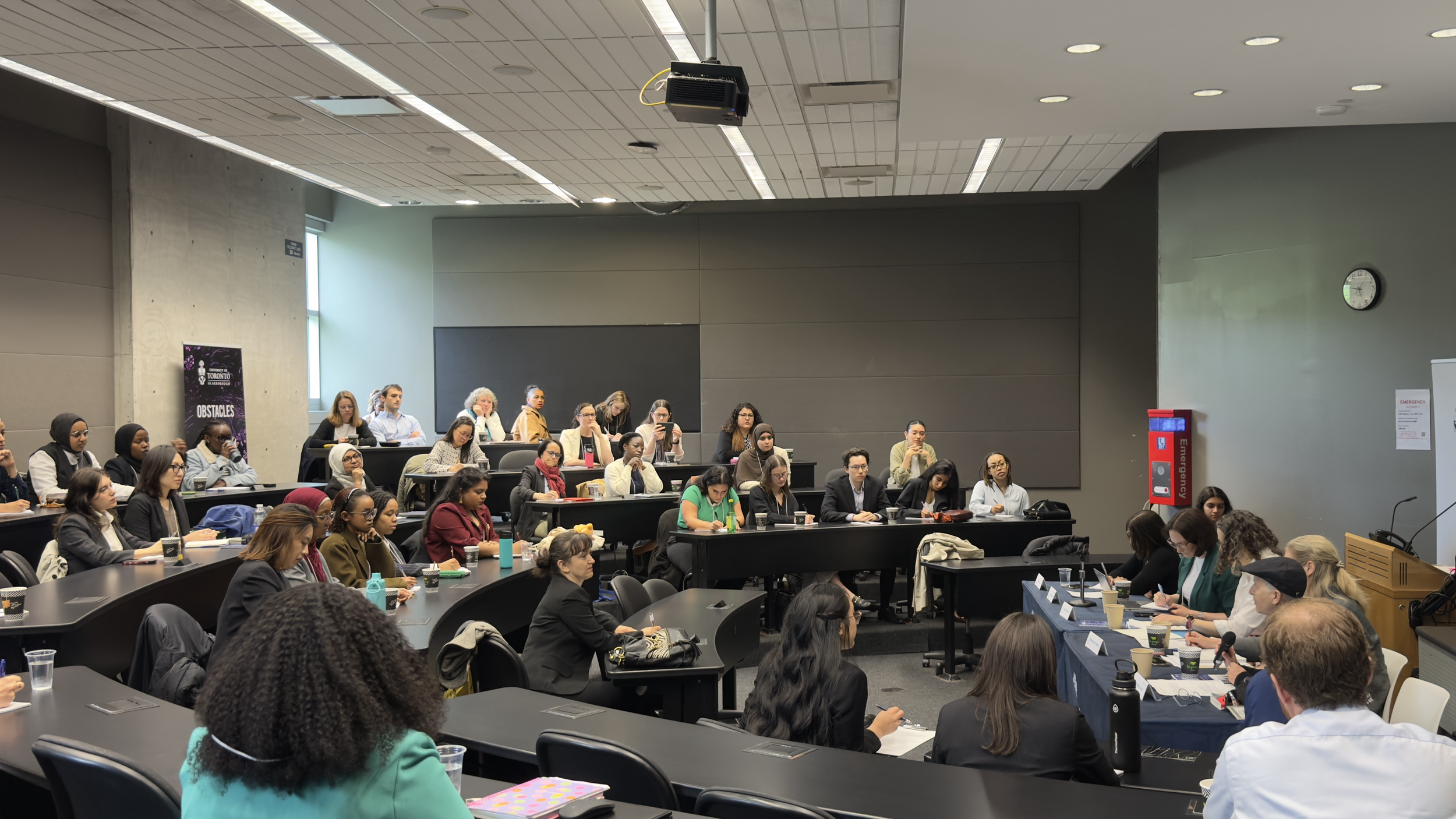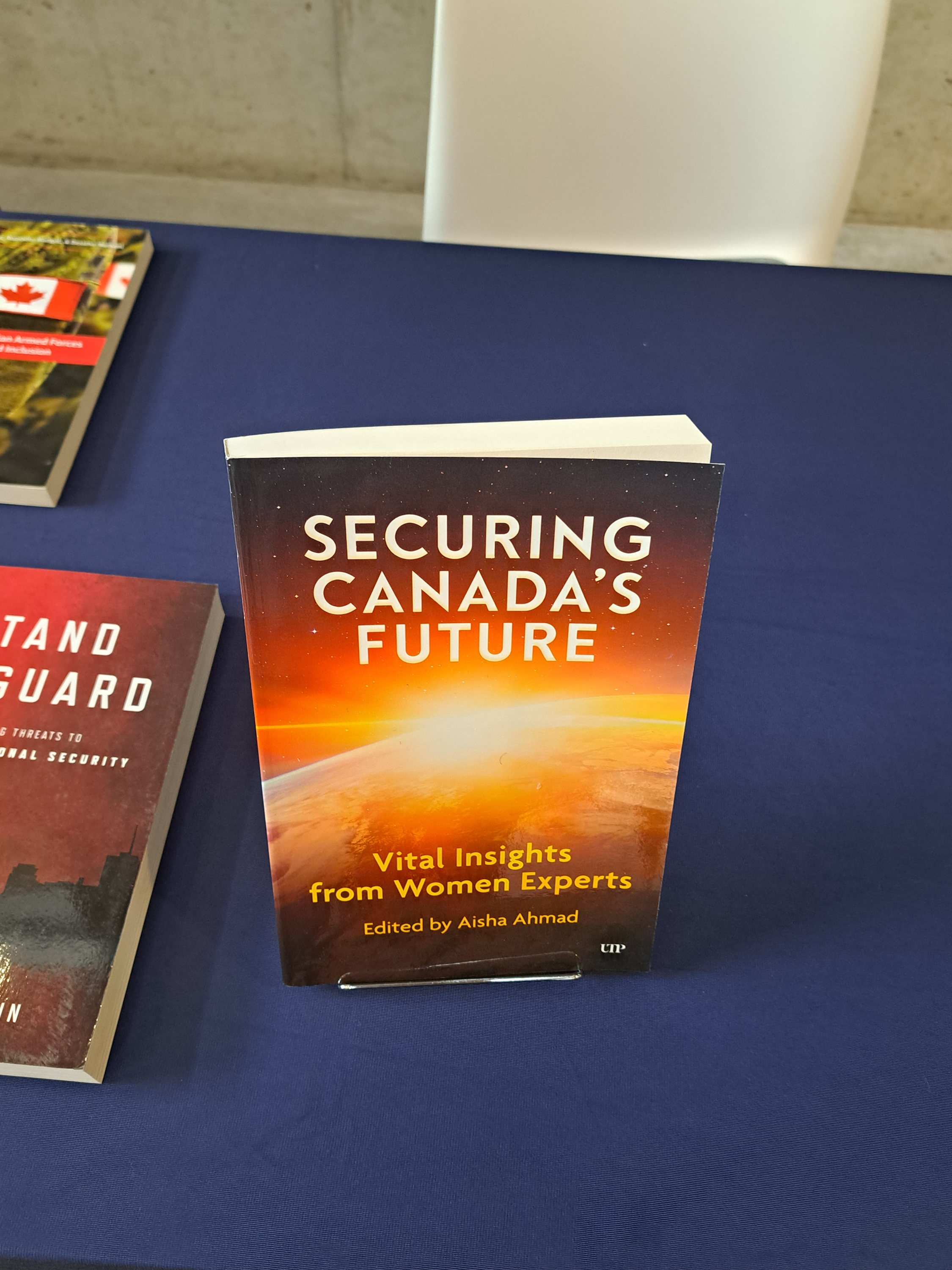Exploring Canadian security at UTSC’s Political Science Symposium
The symposium hosted by Professor Aisha Ahmad featured a panel discussion among notable female scholars and professors in various disciplines of Canadian security.
Introduction of panelists at the Canadian Security Amid Global Change Research Symposium. (Photo By: Omotayo Ayorinde // The Underground)
The North Atlantic Treaty Organisation (NATO)’s minimum spending on defence expenditures is relevant in today’s discussion about Canadian security. In 2014, the heads of state and governments under NATO agreed to dedicate a minimum of two per cent of their Gross Domestic Product (GDP) to the organisation’s efforts in financing the Armed Forces, Ministry of Interior Troops forces, expenditures for war reserves, peace-keeping and humanitarian operations, research and development, amongst others. That year, only three Allies — Greece, the United Kingdom, and the United States — met this requirement.
This topic was the first round of panel discussions in the Canadian Security and Global Change research symposium on Saturday, 31 May at the Kina Wiiya Enadong (KW) Building, hosted by Professor Aisha Ahmad from the Department of Political Science at the University of Toronto, Scarborough.
Since Russia invaded Ukraine, a number of Allies have increased their defence spending, with 11 countries meeting the two per cent target in 2023, compared to 6 in 2021, according to NATO.
Canada, among 32 NATO countries, has failed to meet this requirement with an estimated contribution of 1.37% in 2024. NATO’s latest publication on defence spending underlines that the two per cent GDP requirement is a key indicator of individual Allies’ commitment to supporting NATO’s defence efforts. What this means for Canada, given its decision not to meet this demand, remains a central question for scholars, experts of national security and the panelists at UTSC.
The symposium featured a panel discussion among notable female scholars and professors in various disciplines of Canadian security, including NATO alliances, Canada-U.S. relations, foreign relations, international economics, public policy, and human rights law and institutions.
Additionally, the symposium featured poster presentations of both undergraduate and graduate students in the department. The event also consisted of panel discussions on four main issues: national security, human security, economic security, and environmental security. The attendance of students, faculty members, and graduate students communicated a strong message about the cruciality of the theme of the symposium.
Discussions about national security were centred around Canada’s relations with the United States, and promoting defence awareness among Canadian students and citizens. Professor Barbara J. Falk, an Associate Professor in the Department of Defence Studies at the Canadian Forces College (CFC), highlighted an important point on the intersection of the Refugee Convention of 1951 and the Safe Third Country Agreement.
In the second session of the panel discussions, speakers expanded on human security from the lens of defending human dignity amid rising global injustices. Dr. Irma Spahiu, professor at UTSC, began the session by emphasising the conceptual understanding of security and what humans should be protected from. She stressed the importance of framing as a key factor in discussing human security.
“Asylum seekers are viewed as threats. Protests and demonstrations are scrutinised due to the framing of security,” she mentions.
This informs the legal responses that we see in immigration today. Dr. Spahiu also emphasises the importance of putting safeguards in place to ensure that Charter rights are meaningful and realistic. She also comments on the U.S. political atmosphere in relation with divided rhetorics being practiced by elected officials like Trump.
“When we see a leader making these types of decisions, ask yourself if you need to buy into the us vs. others narrative.” She ended her session reiterating that there is a need to practice caution, to avoid falling prey to oppressive national defence strategies.
Dr. Jennifer Welsh, a professor in the Political Science department and at the Max Bell School of Public Policy at McGill University, also agreed that the ideology of the Trump administration upholds the strong vs. weak narrative.
Dr. Martha Balaguera, an assistant professor in the Political Science department provided insightful contributions by emphasising, “the pursuit of state security might clash with the security of individuals.” This suggests that in the pursuit of state security, fundamental human rights are often compromised. It raises a critical question: should state security take precedence over human security, or can the two be prioritised equally?"
The question was addressed by Dr. Nicole Bernhardt, an assistant professor in the Political Science department, during their discussion on the primacy of human rights. She mentions, “Human rights should be at the centre of all government considerations, and this is something that has not been achieved.” She believes that street-level movements focusing on human rights protection are the only way forward.
Book stand displaying some published works of the panelists. (Photo By: Omotayo Ayorinde // The Underground)
In the third panel discussion, speakers spoke on safeguarding prosperity in an era of tariffs and global economic shocks. With the focus on Trump’s trade war, Dr. Iris Au, a professor in the Management department at the University of Toronto, emphasises two ways we can frame economic security: on a macro and micro level.
The macro level refers to Canada, Ontario, and the GTA’s economy, to an extent. The micro level refers to an individual’s economic security based on the imposition of tariffs. She also highlights, “Tariffs have been in place for a long time. What is new is the scope of the tariff. The problem is the threat and uncertainty that it has posed.”
A publication of the Bank of Canada provides some prospective implications: a decline in the volume of exports to the U.S, lower global trade relations, and lower demand for Canadian products. Overall, it can lead to the depreciation of the Canadian dollar. Dr. Au recommended trade diversification as a solution to the problems posed by the trade war.
With a range of experts from energy policy, public safety, to hydrogen energy, the fourth panel discussion examined how economic growth and climate concerns intersect, focusing on the development of new energy pipelines in the oil and gas industry. Dr. Laura Tozer, assistant professor in the department of Physical and Environmental Sciences, expresses her disappointment in the recent election, which posed a false trade-off between economic development and climate impact.
“There doesn’t have to be a trade-off. It portrays the idea that climate action is optional,” she states. She referenced an OECD report, which highlights that “Accelerated climate action can drive economic growth while delivering environmental and social benefits.”
Dr. Kathryn Harrison, Dr. Nirupama Agrawal, Dr. Tanzina Mohsin, and Dr. Keena Trowell ended the panel discussion with valuable perspectives, rounding up the event with great insights that tied the major themes of the discussion together.
The importance of facilitating spaces that hold critical conversations about trending topics in Canada cannot be overemphasised. With the four major themes of national, human, environmental and economic security, the symposium provided a platform for dialogue between experts and students in the Political Science Department.
The panelists recommend that students produce content on Canadian defence and security to promote defence literacy in Canada. This way, students stay aware and informed, helping them make informed decisions during elections.

